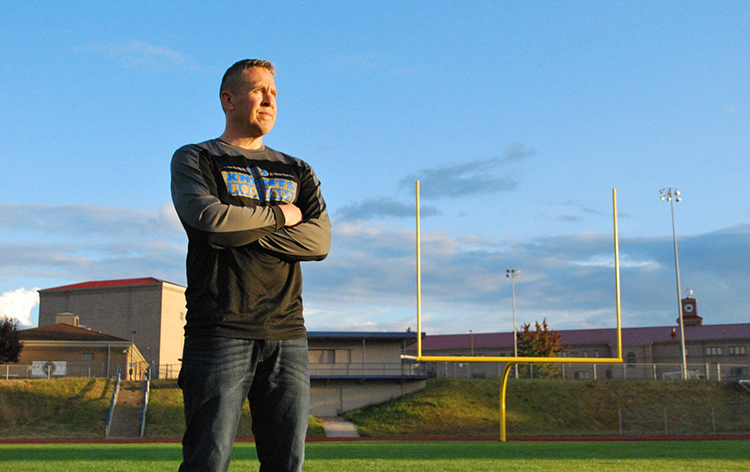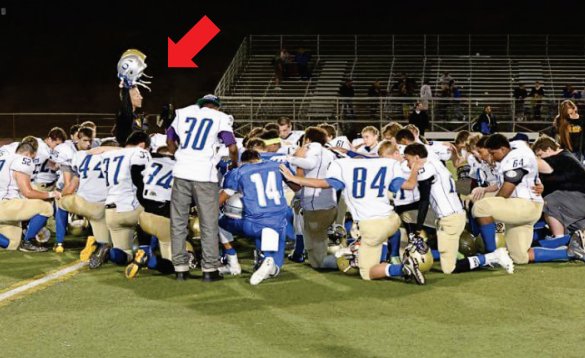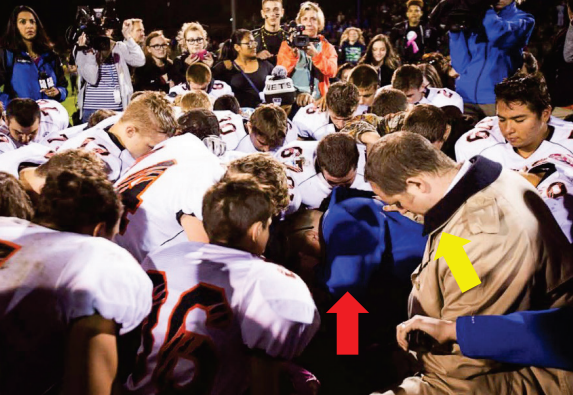Supreme Court considers whether high school football coach has right to pray on the field

"I wasn't to be praying where anybody, the kids or anybody in the stands, could see me," Joseph A. Kennedy says. "That's where the rub was. That, I think, is what ultimately led us here." Photo from the First Liberty Institute.
Joseph A. Kennedy says he never intended to create a “ruckus.” His prayers following football games at a public high school were “personal and private.”
“It’s me giving thanks after a football game. Pretty simple,” says Kennedy, who was the junior varsity coach and assistant varsity coach at Bremerton High School in Washington state in 2015 when his prayers at the 50-yard line did lead to quite a fuss.
After scaling back some religious expression at the request of school administrators, Kennedy announced he would continue kneeling and praying after Bremerton’s homecoming game that October. Some players from the other team joined him, as did some spectators, who rushed from the stands and created what the district termed a “circus on the field.” The coach became a frequent guest on cable TV news, and his cause was embraced by conservative religious and legal groups.
Though he has lost repeatedly in the lower courts, his case goes before the justices Monday.
“The First Amendment protects Kennedy’s prayer twice over,” the coach’s lawyers say in a brief, referring to the free speech and free exercise of religion clauses. “Public school employees have no constitutional right to inject prayer or proselytization into their official duties. … But schools cannot define the job duties of teachers and coaches to be so all-encompassing as to deny them all rights to individual expression on school grounds.”
The Bremerton School District, which is located near Seattle and has about 4,700 students, argues Kennedy was an employee engaged in official duties, so his speech could be regulated.
“The district is paying somebody to speak and convey its message,” says Richard B. Katskee, the vice president and legal director of Americans United for Separation of Church and State, which is representing the school district.
“They give him the charge of the students at the football game, at the center of the field,” Katskee says. “When he is supposed to be giving motivational speeches, as coaches do, instead, for many years he was delivering prayers to the students. And when the district found out that’s what he was doing and told him to stop, he insisted that he had to be allowed to continue that practice.”
The case of Kennedy v. Bremerton School District arrives at a U.S. Supreme Court dominated by conservatives who have shown special solicitude to religious liberty claims in recent years.
Kennedy and his supporters suggest possible ways for the court to rule in the coach’s favor. The school district and its allies call for protecting students from religious coercion, and they worry that decades of high court precedent may be undone and lead to more widespread religious expression in public schools.
“Public schools serve about 90% of the U.S. population,” says Holly Holman, the general counsel of the Baptist Joint Committee for Religious Liberty, which filed a friend-of-the-court brief supporting the Bremerton School District. “Students come from all different religious backgrounds. And they should get an education and opportunities to be involved in extracurricular activities and sporting events without regard to religion.”
Kennedy, meanwhile, has support from 27 states, former Clemson University football coach Tommy Bowden; current and retired pro football players; and scholars, some of whom say the court should use the case to clarify its doctrine on employee and student religious expression in public schools.
Richard W. Garnett IV, a law professor at the University of Notre Dame, helped write a brief in support of Kennedy that calls on the court to reexamine its “endorsement test,” which asks whether a reasonable observer would think the government was endorsing a particular religious message.
“The court has had almost 40 years, and the cases are not any more predictable or consistent,” Garnett says. “We’re going big and saying let’s use this opportunity to clarify for regulators and private speakers alike.”
 Joseph A. Kennedy (red arrow) says his Christian beliefs require him to give thanks through prayer at the end of each game. Photo from Bremerton School District brief.
Joseph A. Kennedy (red arrow) says his Christian beliefs require him to give thanks through prayer at the end of each game. Photo from Bremerton School District brief.
First down at the 50-yard line
Kennedy, 52, is a Bremerton High School graduate who served in the U.S. Marine Corps for 20 years before taking a job at the nearby Puget Sound Naval Shipyard in 2006. He joined the football coaching staff part-time a couple of years later. Reflecting his Christian faith, Kennedy began kneeling in private prayer after games, and his players sometimes joined him. The coach also gave motivational talks with references to religion and participated in a long tradition at the public high school of pregame prayers in the locker room.
His religious activities did not attract notice until 2015, when another school’s official mentioned it to Bremerton Superintendent Aaron Leavell. The superintendent informed Kennedy in writing that the locker room and postgame prayers had to end and that he was free to pray while on the job if it did not interfere with his job responsibilities and if it was “nondemonstrative.”
The coach essentially complied for about a month, but matters came to a boiling point at Bremerton’s Oct. 16, 2015, homecoming game. By then, Kennedy had contacted lawyers with the First Liberty Institute, a legal organization based in Plano, Texas.
Hiram S. Sasser III, a First Liberty lawyer who has been on the case from the beginning, says Kennedy and the group thought there would be a quick resolution with the district to allow the coach to continue postgame prayers. (The group didn’t press the district on the locker room prayers.)
Kennedy announced publicly that he intended to return to praying at the 50-yard line after the homecoming game. His team did not join him, but the opposing team did, as well as members of the public who climbed fences. According to the school district, the boisterous crowd knocked down cheerleaders and marching band members.
“There’s nothing about that that’s personal or private,” Katskee says.
Leavell sent another letter to Kennedy after the homecoming game, instructing him to stop his prayers while “on duty” at games. He could pray in private, such as in the school building or press box, the district said. But Kennedy continued to demand to conduct his prayers midfield right after the game.
Under the superintendent’s directive, “I wasn’t to be praying where anybody, the kids or anybody in the stands, could see me,” Kennedy says. “That’s where the rub was. That, I think, is what ultimately led us here.”
Kennedy was placed on administrative leave and didn’t return the next season. The coach sued under the First Amendment, leading to years of litigation as the coach sought reinstatement with the right to pray as he wanted.
After a federal district court and the San Francisco-based 9th Circuit U.S. Court of Appeals denied the coach’s bid for an injunction, his case reached the Supreme Court in 2019. The high court denied review, but four justices issued a statement that said while they agreed on procedural grounds that the court should not take up the case at that point, they were troubled by the lower courts’ understanding of the free speech rights of educators.
“The suggestion that even while off duty, a teacher or coach cannot engage in any outward manifestation of religious faith is remarkable,” Justice Samuel Alito wrote in the statement that was also signed by Justices Clarence Thomas, Neil Gorsuch and Brett Kavanaugh.
The case returned to the lower courts, and on the merits, a federal district court held that the school district had a legitimate concern that permitting the coach to conduct his midfield prayers would violate the First Amendment clause prohibiting government establishment of religion.
A 9th Circuit panel affirmed. When the full appeals court declined to rehear the case, there was a flurry of feisty written opinions. One judge, Milan D. Smith Jr., even had some personal criticism for the coach, saying Kennedy’s “‘everybody watch me pray’ staged public prayers … so clearly flout the instructions found in the Sermon on the Mount on the appropriate way to pray.” Smith included a footnote quoting from the Gospel of St. Matthew.
 Joseph A. Kennedy (red arrow) and Washington State Rep. Jesse Young (yellow arrow) with his hand on Kennedy’s back. Photo from Bremerton School District brief.
Joseph A. Kennedy (red arrow) and Washington State Rep. Jesse Young (yellow arrow) with his hand on Kennedy’s back. Photo from Bremerton School District brief.
A ‘suggestion of mootness’
The temperature around the case may have cooled as it returns for full merits consideration by the justices—or not.
The district in February filed a “suggestion of mootness,” noting that Kennedy and his wife had moved from Bremerton to Pensacola, Florida, so he couldn’t easily retake his job if he won. The coach’s lawyers say a simple phone call would have clarified that the Kennedys had family matters to attend to in Florida and that the coach stands ready and willing to return to Bremerton if he wins reinstatement.
Leavell, who declined an interview request, was generally courteous and patient in his communications with Kennedy.
The coach “was a positive presence in the football program, and I sympathized with his frustration at not being able to pray in the manner that he wanted,” Leavell said in a 2019 affidavit, but “I believed it was my job to ensure that the conduct of district employees did not violate the constitutional rights of students and other community members.”
Kennedy sounded a gracious note, saying he has always considered the superintendent a friend.
“If I get reinstated as a coach, it’s just going to be me by myself” praying, Kennedy said. “That is it. That is all this ever was about.”
See also:
ABAJournal.com: “Supreme Court will hear case of praying football coach”
ABAJournal.com: “In praying football coach case, 4 SCOTUS justices criticize 9th Circuit’s ‘highly tendentious’ reading of precedent”
Write a letter to the editor, share a story tip or update, or report an error.


